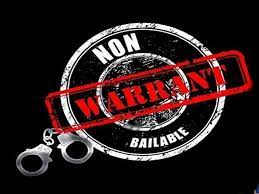When Can Court Issue Non-bailable Warrants?
At the first instance, the Courts issue summons alongwith the copy of the complaint to the Accused and in case, the Accused fails to appear on the date stated in the summons, the Courts issues a bailable warrant against the Accused (bailable warrants are warrants issued by a court with an endorsement, that if the person against whom the same are issued is arrested, executes a bond for an amount stated in the warrant alongwith surety for his appearance before the court issuing such warrant, he may be released on furnishing such bond and surety).
In the event of non-appearance of the Accused after issuance of bailable warrants, the court issues a non-bailable warrant of arrest upon the Accused. The non-bailable warrants are executed by a police officer or any other person to produce the Accused before the Court after his arrest.
As the issuance of non-bailable warrant curtails the liberty of an Accused, hence the Courts have been directed from time to time by the Apex Court to follow the guidelines before exercising their discretion of issuing non-bailable warrants. The discretion of issuing non-bailable warrants are to be exercised by the courts carefully and reasonably so as to avoid harassment and humiliation by the Accused Persons at the hands of police or any other person. The issuance of warrants are provided under Section 70 to 81 of Cr.P.C.
However, practically the courts issue non-bailable warrants in a routine manner. If an Accused is not present in the Court at the time, when his case is called upon, the courts without waiting for the Accused, usually issues non-bailable warrants. Once, non-bailable warrants are issued, it can be cancelled by only the Court issuing the same and hence, an application is to be moved for cancellation of non-bailable warrants by the person against whom the same are issued. The application should state the reason for non-appearance of the Accused at the time of hearing. The non-bailable warrants are cancelled by the Courts subject to certain cost payable by the Accused. It is important to obtain attested copy of the order (also known as Robkar) wherein the non-bailable warrants are cancelled by the court as it has been noticed, a number of time that despite non-bailable warrants having been cancelled, the police officer arrests the Accused. This happens due to the reason that the copy of cancellation orders is not received by the police officer and he is duty bound to execute the non-bailable warrants already issued by the concerned Court. In such a case, the police officer arrests the person and keep him in police custody on that day and produce him before the Court on the next day. It is advisable to keep original attested copy of the order of cancellation to avoid unnecessary humiliation and arrest.
The above information is to impart awareness and no part of this should be construed as providing legal advice for any purpose.
Vikram Kumar
Advocate


